If you’re on the hunt for brake pads that offer reliable performance, minimal dust, and long-lasting quality, then you need to consider Wagner ThermoQuiet Ceramic Disc Brake Pads. After using these pads on my car, I can confidently say they’re worth every penny.
Whether you’re commuting daily, navigating through city traffic, or making weekend getaways, Wagner brake pads provide a smooth, responsive braking experience that you can trust.
Let me walk you through what makes them so good, and by the end, you’ll see why they could be the right choice for your vehicle.
My Experience With Wagner Brake Pads
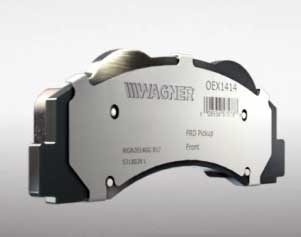
When I first switched to Wagner ThermoQuiet Ceramic Brake Pads, I wasn’t sure what to expect.
I had used several other brands over the years, but none of them really stood out.
From the moment I installed these pads, though, I could tell there was something different.
The first thing that impressed me was how quiet they were.
I’ve dealt with squeaky brakes before, and it’s always been a hassle. With the Wagner ThermoQuiet pads, that was a thing of the past.
My daily commute became smoother and quieter right away, and I didn’t have to deal with that irritating brake chatter.
Performance-wise, they really shined when I needed them most—during heavy braking. Whether I was making an abrupt stop in city traffic or cruising at highway speeds, these pads provided responsive, reliable braking.
I felt confident in their stopping power, which isn’t something you can always say about brake pads.
What really sealed the deal for me, though, was the minimal brake dust. I love keeping my car looking sharp, and these pads produced almost no visible dust.
With previous pads, I’d often find myself cleaning my wheels more often than I’d like. Wagner brake pads allowed me to keep my wheels cleaner without sacrificing braking performance.
The installation process was straightforward, though I did have to grind the ears a little to ensure a proper fit in my calipers. After a short break-in period, the pads started to perform even better, offering smooth stops and consistent performance.
I’ve driven thousands of miles with these pads now, and I can honestly say I’m impressed. They’re durable, perform well under pressure, and save me from the hassle of constant cleaning. I’ll definitely stick with Wagner ThermoQuiet pads for my future brake replacements.
Pros of Wagner ThermoQuiet Brake Pads
Let’s start with the good stuff, and there’s plenty to talk about when it comes to Wagner’s ThermoQuiet brake pads. Here’s what stood out for me:
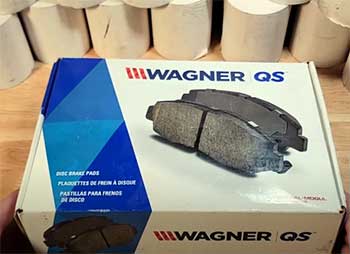
- Quiet Operation: True to their name, these brake pads live up to the “ThermoQuiet” promise. Right from the start, I noticed the significant reduction in noise compared to other brake pads I’ve tried. No more squeaking or rattling—just a smooth, quiet ride, which is exactly what I wanted.
- Minimal Brake Dust: One of the biggest advantages for me was the near absence of brake dust. If you’re like me and take pride in keeping your car looking sharp, you know how frustrating it can be to constantly clean off that stubborn black dust from your wheels. With Wagner, this issue becomes almost nonexistent.
- Durability: I’ve logged thousands of miles with these pads and noticed how well they wear over time. With a combination of city driving and the occasional road trip, they’ve held up extremely well. Wagner’s ceramic formulation ensures a longer lifespan compared to organic or semi-metallic pads. I’ve heard of people getting up to 50,000 miles or more, and based on what I’ve seen, I wouldn’t be surprised.
- Excellent Braking Performance: Performance-wise, I’ve been impressed with how these pads handle both light and heavy braking. Whether I’m cruising down the highway or making abrupt stops in stop-and-go traffic, the response is always crisp and smooth.
- Built-In Insulation Technology: The integrated shim design reduces vibration, noise, and heat buildup. This isn’t just some gimmick—it’s something that genuinely impacts your everyday driving experience. With less heat, your brakes stay cooler, and cooler brakes tend to last longer and perform better.
Cons of Wagner ThermoQuiet Brake Pads
Of course, there’s no such thing as a perfect product, and Wagner’s ThermoQuiet brake pads have a few downsides that are worth considering:
- Break-In Period: One downside I’ve experienced—and I’ve seen others mention this as well—is that these pads can have a slightly longer break-in period. Initially, the braking may feel a bit softer than expected, but after putting some miles on them, the pads settle in nicely. Reusing old rotors can exacerbate this, so I recommend pairing new pads with new rotors if possible.
- Slightly Higher Price Point: Compared to some house-brand or generic pads, Wagner brake pads might seem a little pricier upfront. However, in my opinion, the extra cost is easily justified by their performance and longevity.
- Installation: Installing these pads can be straightforward, but I did have to do some light grinding on the ears of the pads to get them to fit just right in my calipers. This isn’t a dealbreaker, but it’s something to keep in mind if you’re doing the installation yourself.
How To Get The Most Out Of Your Wagner Brake Pads?
If you want to maximize the lifespan and performance of your Wagner brake pads, here are a few tips I’ve picked up along the way:
- Proper Break-In: The break-in process is essential for any brake pad, and Wagner ThermoQuiet pads are no exception. After installation, make sure to follow a series of moderate stops to allow the pads to properly bed into the rotors. This process helps ensure you get optimal performance and longevity from your brakes.
- Regular Maintenance: It’s easy to forget about your brakes until something goes wrong, but regular maintenance can make a world of difference. Check the brake pads and rotors periodically for signs of wear. If you notice the pads getting too thin, it’s time for a replacement before you start hearing that unpleasant screeching noise.
- Keep It Clean: Even though these pads produce minimal brake dust, it’s still a good idea to clean your wheels periodically. Dust can accumulate over time and negatively affect both the appearance of your car and the performance of your brakes.
- Lube the Contact Points: When installing these pads, don’t forget to lubricate the contact points between the shims and the pads. This helps reduce noise and ensures smooth operation.
- Pair with Quality Rotors: While Wagner ThermoQuiet pads will perform well on their own, I found they work even better when paired with high-quality rotors. Avoid using old, warped, or excessively worn rotors, as they can lead to uneven pad wear and reduced braking efficiency.
Comparing Wagner Brake Pads With Other Brands
Now, how do Wagner ThermoQuiet brake pads stack up against other popular brands? After trying several other options over the years, here’s what I’ve found:
- Akebono Brake Pads
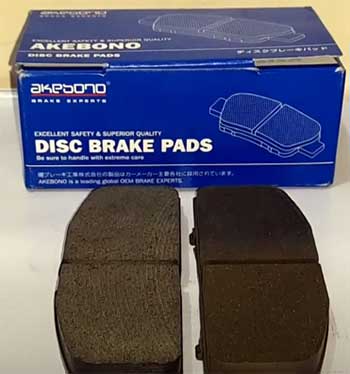
Akebono brake pads have earned a reputation for offering smooth, quiet braking with minimal brake dust.
One of the standout features is their ceramic formulation, which not only reduces noise but also makes them extremely gentle on your rotors.
This is great because it extends both the life of your pads and your rotors, ultimately saving you money.
What I love most about Akebono is the consistent performance you get in all conditions—whether it’s stop-and-go city traffic or cruising on the highway.
There’s no need for a break-in period, and from day one, the braking feels responsive and smooth.
Another big plus is the ultra-low dust production. If you’ve ever had to clean your wheels frequently due to grimy brake dust, Akebono is a game changer. These pads produce far less dust, keeping your wheels cleaner for longer.
Additionally, they are known for their durability, making them a great long-term investment.
- Bendix Brake Pads
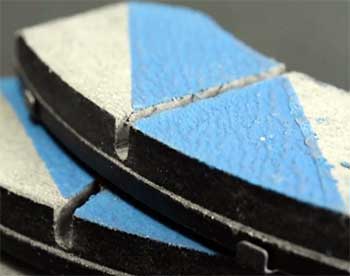
Bendix is another well-respected name in the brake pad industry, and they offer both ceramic and semi-metallic options.
Their semi-metallic pads are often favored for their aggressive stopping power, particularly in heavy-duty applications.
However, there’s a trade-off when it comes to noise and dust.
Bendix pads, especially the semi-metallic versions, can produce more brake dust compared to Akebono’s ceramic pads.
o, if keeping your wheels clean is important, you might find Bendix to be more of a hassle in that regard.
Noise can also be an issue with Bendix pads, particularly when they are cold or after exposure to wet conditions. They’re not as consistently quiet as Akebono, which could be a dealbreaker for those prioritizing a smooth, silent ride.
However, if you’re looking for a high-performance option, particularly for heavier vehicles or if you drive under extreme conditions, Bendix may offer the extra stopping power you’re after.
- Dynamic Friction Brake Pads
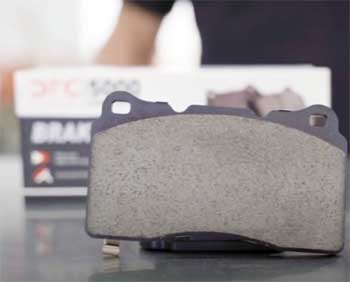
Dynamic Friction is gaining traction in the brake pad world, especially for performance drivers.
Their pads are known for offering excellent stopping power and are a solid choice for people who want more aggressive braking performance.
If you’re into performance driving or tend to push your vehicle harder than the average commuter, Dynamic Friction pads could be a great fit for you.
They do a good job of handling higher heat levels, which is important for sustained braking under heavy loads or spirited driving.
That being said, Dynamic Friction pads can be a bit harsher on your rotors compared to Akebono’s rotor-friendly ceramic formula. Over time, this could mean more frequent rotor replacements, which adds to your overall maintenance costs.
Additionally, while they perform well in more demanding driving situations, they aren’t as quiet or low-dust as Akebono brake pads. So, if you’re looking for pads that excel in everyday driving while being easy on maintenance, Akebono still has the edge.
FAQs About Wagner Brake Pads
Yes, Wagner is a highly reputable brand known for its high-quality brake products. The ThermoQuiet line, in particular, is praised for its quiet operation, minimal dust production, and overall durability. It’s a brand that has earned trust among both DIYers and professional mechanics alike.
Wagner brakes are manufactured by Federal-Mogul, a well-established company in the automotive parts industry. Federal-Mogul has been around for decades and is known for producing reliable, high-performance automotive components.
There isn’t a one-size-fits-all answer to this question, as the best brake pads for you depend on your vehicle, driving style, and personal preferences. However, Wagner, Akebono, and Bosch are among the top brands that consistently receive high marks for their quality, performance, and longevity.
Yes, the Wagner QS (QuickStop) line is another excellent option from Wagner, particularly if you’re looking for affordable yet reliable brake pads. They’re designed for smooth, quiet braking and are a great choice for everyday driving.
Wrapping Up
When it comes to brake pads, Wagner ThermoQuiet Ceramic Disc Brake Pads are a fantastic option for anyone seeking quiet, reliable, and long-lasting performance. They offer excellent value for money, with minimal dust, and have held up well for me over thousands of miles.
If you want brake pads that you can count on in both everyday driving and more demanding conditions, I highly recommend giving Wagner a try.
With their built-in insulators and ceramic formulation, these pads are designed for drivers who value peace of mind and consistent performance. Make the switch, and I’m confident you’ll notice the difference from the moment you hit the brakes!

